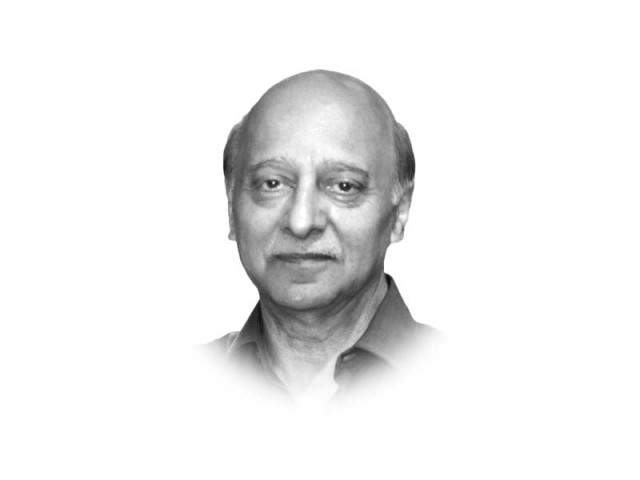IMF trap and flawed tax policies: who’s responsible?
Why should Pakistan pay up to $4 billion annually to maintain some 134 largely inefficient public-sector enterprises?

Who makes Pakistan’s tax policies? If it is economists at work, we certainly have the wrong economists. And if it is the bureaucrats, it is even more disastrous because the country’s financial health betrays their limited understanding of this intricate matter. Or is it a combination of both that has worked over decades as hitmen to financially enslave Pakistan?
These questions relate to two current issues: taxation regime and the impending deal with the IMF. Pakistan right now is eyeing a billion dollar tranche from the $6 billion package? Contrast this with the potential of textile exports that got us nearly six billion dollars in just four months of this fiscal year so far.
Why are we then dying for the release of just one billion dollars — that too at the cost of nearly 14% depreciation of the rupee?
“Don’t let the IMF/WB dictate you because you are not a slave to them,” US economist Dr Arthur Laffer said at the Pakistan Prosperity Forum 2021 recent organised by the PRIME Institute. The IMF has done all it could to keep Pakistan less profitable, Laffers maintained, cautioning against losing another generation by implementing the advice of multilateral creditors.
Laffer’s words remind us of Yanis Varoufakis, a former Greek finance minister. He could barely survive in office for six months just because of his opposition to the manipulative 1000 billion euros worth of loans to his country.
Varoufakis’s tenure was a story of almost daily confrontations with the IMF, the European institutions, and most of all with a German government that seemingly held him in contempt. He equates global banks, multinational corporations, governments, and the ‘supranational’ IMF to ‘super black boxes’ run by influential politicians and bureaucrats who are good at converting ‘inputs’ such as money, debt, taxes and votes into ‘outputs’ such as profit, more complicated forms of debt, reductions in welfare payments, health and education policies.
These black boxes, Varoufakis insists, are controlled by networks of power comprising their CEOs — the insiders of the system — who decide who to co-opt (such as consulting economists, technocrats) from the outside and who to exclude (such as those who may blow the whistle on their internal machinations).
Asad Umar, as finance minister, tried to emulate Varoufakis in 2019 but was quietly chucked out to another ministry. Now we have more pliant functionaries — Shaukat Tarin, Raza Baqir and Azam Khan — and the IMF seems to be more than happy with them.
Now let us look at the taxation conundrum.
Leading tax experts Huzaima Bukhari and Dr Ikramul Haq insist on simplifying tax laws and lowering tax rates to broaden the tax net. They have been proposing to: bring down the income tax rate to 10% on an average; reduce the sales tax rate to 5 to 6%; bring the rate of customs duties down to a single digit; and increase the ratio of direct taxes to 66% so as to shift the tax burden on the affluent class.
This regime should lead to reduction in tax rates and expansion in the tax base.
Dr Laffer, meanwhile, delved into the issue, emphasising that:
• Government regulations and taxes represent hurdles, and act as negative incentives.
• Taxes are used to discourage bad behaviours like restricting smoking by imposing taxes. But taxing incomes ever higher means making earning more less attractive.
• Low tax rates help in broadening of tax base and the country grows at a faster pace. The US benefitted immensely when it brought down personal income tax from 11 brackets to just 2 brackets. The Personal Income Tax was reduced from 56% to 28% while the corporate tax rate was reduced from 36 to 34%.
Dr Ikram and Laffers are basically advocating the need for broad, flat and predictably low taxes to discourage theft and evasion. Both advise massive privatisation as governments are not meant to run businesses.
Laffers said Turkey, under President Erdogan, sold out most state-owned enterprises, including the Turkish Airlines, currently one of the best airlines flying across the globe.
Why should Pakistan pay up to $4 billion annually to maintain some 134 largely inefficient public-sector enterprises? Who is resisting privatisation? Who is creating more authorities/entities under the government and why?
Some basic questions for PM Imran Khan to ponder indeed.
Published in The Express Tribune, November 24th, 2021.
Like Opinion & Editorial on Facebook, follow @ETOpEd on Twitter to receive all updates on all our daily pieces.














COMMENTS
Comments are moderated and generally will be posted if they are on-topic and not abusive.
For more information, please see our Comments FAQ